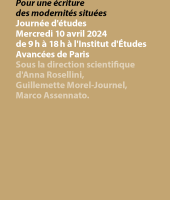Architecture and History. For the writing of situated modernities.
Study day organized by Anna Rosellini, Guillemette Morel-Journel and Marco Assennato, involving two teams from the UMR CNRS AUSser: OCS (ENSA Paris-Est) and ACS (ENSA Malaquais).
Free admission with registration (see registration form at bottom of page).
Presentation
Reflecting on the way in which modern architectural historiography has been constructed (written and thought), and thus taking stock and re-launching a reflection on the relationship between architecture and modernity, seems to us to be a matter of urgency if we are to redefine the foundations of the architectural field, faced with the great challenges of the contemporary world. We are convinced that the problems of modernity are still our own: we are living through a late modernity, a passage in which the characteristics of the Modern persist, even though they have undergone dromological deformation, a powerful acceleration that exacerbates conflicts and contradictions - ecological, social and political. Our aim is to revive an epistemological reflection on modern history in order to think about contemporary architecture (and that of the future). The study day on April 10 at the Paris IAS is intended as a first opportunity for joint work, with each researcher sharing their historiographical methods.
We propose to open up 4 theoretical areas around which to imagine an international conference (2024-2025):
1. A Global History.
In this session, we wish to address the global dimension of the history of modern architecture. For us, this means taking an in-depth look at the different temporalities that run through the migrations of modern architecture, and determining territorial scenes as permeable entities in which international themes are inflected and adapted to local intellectual powers, knowledge, social practices and anthropo-geographical conditions. Our aim is to explore the possibility of a radical decolonization of historiography.
2. A political history
We would like to use history as a space for critical (and scientific) verification of the architectural discourses, ideological justifications and professional practices that have permeated modernity. But there's more to it: if modernity has been able to globalize, it hasn't universalized (it has always encountered resistance that has nurtured it).
3. A Material History
Climate change has radically altered our relationship with the materials used to make objects, both those extracted from nature and those produced by man. But this relationship between materials and architecture has a rich (and uninterrupted) history: from the earliest treatises to the revolution of glass, steel and concrete, architecture and materiality are intertwined, defining the theoretical and plastic axes of the discipline. Our aim is to explore the effects of the constant relationship between the materials of which objects, buildings and infrastructures are made, natural and topographical contexts, scarce resources and modern architecture.
4. A gendered history
Pluralizing history means breaking with the dominant framework of Western masculine cultural discourse. Our aim is to explore the positive effects of interweaving architectural discourse with new notions produced from a feminist point of view. In this respect, modernity has been an extraordinary laboratory. Today, we urgently need to ask: what can feminist approaches do to challenge canonical historical narratives? What kind of historiographical revision are feminisms in architecture producing?
Program:
9:15 Opening and coffee
9:45
Introduction by Marco Assennato
10:00-13:00
Panel 1
Anna Rosellini (ENSA Paris-Est)
Laurent Koetz (ENSA Paris-Est)
Filippo De Pieri (PoliTo)
Diane Aymard (ENSA Nantes)
Discussant: Federico Ferrari
13:15-14:30 Lunch break
15:00-18:00
Panel 2
Luc Baboulet (ENSA Paris-Est)
Sophie Paviol (ENSA Grenoble)
Carlotta Darò (ENSAPM/ETH Zurich)
Sebastien Marot (ENSA Paris-Est)
Discussant: Guillemette Morel-Journel
Practical information
Free admission with registration (see registration form at bottom of page).
|
|
|
|
|
|
